Amos 7 meaning explained in AI Summary
Chapter 7 of the Book of Amos details three symbolic visions granted to the prophet by God, followed by an interlude highlighting the conflict between Amos and Amaziah, the priest of Bethel.
Visions of Judgment (7:1-6):
1. Locusts: God shows Amos a vision of locusts devouring the land's vegetation after the spring harvest. This represents a devastating plague that would leave the people with nothing. Amos pleads with God to relent, and God shows mercy, withdrawing the judgment.
2. Fire: The second vision depicts a fire so intense that it threatens to consume not only the land but also the very depths of the sea. Again, Amos intercedes, and God relents, sparing his people from the fiery destruction.
3. Plumb Line: In the final vision, God stands beside a wall with a plumb line in his hand. This tool, used to determine vertical accuracy, symbolizes God's judgment on Israel's moral crookedness and deviation from his standards. Unlike the previous visions, there is no intercession or reprieve. God declares that he will no longer overlook their transgressions.
Conflict with Amaziah (7:7-17):
Following the visions, Amos encounters Amaziah, the priest of the royal sanctuary at Bethel. Amaziah, threatened by Amos's pronouncements of judgment against Israel, accuses him of treason and orders him to stop prophesying.
Amos defends his calling as a prophet sent by God and delivers a final, stark message to Amaziah: because of his opposition to God's word, he and his family will face severe consequences, including exile and destruction.
Key Themes:
- God's Justice and Mercy: The chapter highlights the tension between God's righteous anger at Israel's sin and his willingness to show mercy when they repent. The first two visions demonstrate God's compassion, while the third emphasizes the certainty of judgment when repentance is absent.
- The Prophet's Role: Amos's role as a messenger of God, even when his message is unpopular, is emphasized. He boldly confronts both the people and their religious leaders, demonstrating the prophet's responsibility to speak truth to power.
- Consequences of Sin: The chapter warns of the dire consequences of rejecting God and persisting in wickedness. The visions and Amos's pronouncements underscore the inevitability of judgment for those who refuse to turn back to God.
Overall, Amos chapter 7 serves as a powerful reminder of God's holiness, his hatred for sin, and the importance of heeding the warnings of his prophets. It also highlights the courage and faithfulness required of those called to speak God's truth, even in the face of opposition and persecution.
Amos 7 bible study ai commentary
Amos 7 presents a dramatic escalation of God's judgment against the Northern Kingdom of Israel. It moves from two visions of impending disaster averted by the prophet's intercession to a third vision of an unchangeable standard of judgment. This divine pronouncement is immediately challenged by Amaziah, the priest of the corrupt royal sanctuary at Bethel, leading to a direct confrontation where Amos defends his divine call and pronounces a specific, personal curse on the priest, mirroring the national doom.
Amos 7 Context
This chapter is set during the reign of Jeroboam II of Israel (c. 793-753 B.C.), a time of unprecedented peace, territorial expansion, and economic prosperity for the Northern Kingdom. However, this wealth was built on social injustice, oppression of the poor, and rampant religious syncretism. The state-sanctioned worship center at Bethel, established by Jeroboam I (1 Kings 12), combined Yahweh worship with pagan practices, particularly the golden calf, directly violating God's law. Amos, a herdsman from Judah (the Southern Kingdom), was sent by God to this outwardly successful but inwardly corrupt nation to pronounce judgment.
Amos 7:1-3
Thus the Lord God showed me: behold, he was forming locusts when the latter growth was just beginning to sprout, and behold, it was the latter growth after the king’s mowings. When they had finished eating the grass of the land, I said, “O Lord God, please forgive! How can Jacob stand? He is so small!” The Lord relented concerning this. “It shall not be,” said the Lord.
In-depth-analysis
- Vision 1: Locusts. A swarm of locusts symbolizes total devastation of agriculture, the backbone of their economy.
- "Latter growth" (
leqesh): This was the crucial second crop of the season. The first crop, "the king's mowings," was a tax paid to the king. The latter growth was what the common people depended on for survival. This detail highlights that God's judgment would fall heaviest on the people. - Amos's Intercession: Amos acts as a mediator, pleading on behalf of the nation. He appeals to God's mercy based on Israel's frailty.
- "How can Jacob stand? He is so small!": This is a statement of genuine concern. Despite their pride and wealth, Amos sees Israel as spiritually weak and unable to endure God's full wrath. "Jacob" is a name that recalls Israel's covenantal origins and vulnerability.
- God Relents: The Hebrew word
niḥamsignifies God's deep sorrow or change of heart/plan in response to intercession. It shows that judgment, at this stage, is not yet irreversible.
Bible References
- Exodus 32:11-14: "...the Lord relented from the disaster that he had spoken of bringing on his people." (Moses' intercession for Israel after the golden calf).
- Genesis 18:23-33: "...Will you indeed sweep away the righteous with the wicked?" (Abraham's intercession for Sodom).
- Joel 1:4: "What the cutting locust left, the swarming locust has eaten..." (A literal locust plague as a sign of divine judgment).
- Deuteronomy 28:38-42: Locust plagues listed as a curse for disobedience.
Cross References
Num 14:11-20 (Moses intercedes again); 1 Sam 7:5-9 (Samuel intercedes for Israel); Psa 106:23 (Moses stood in the breach); Jer 15:1 (God declares He would not relent even for Moses or Samuel); Joel 2:12-14 (Call to repentance in hope God will relent).
Amos 7:4-6
Thus the Lord God showed me: behold, the Lord God was calling for a judgment by fire, and it devoured the great deep and was eating up the land. Then I said, “O Lord God, please cease! How can Jacob stand? He is so small!” The Lord relented concerning this. “This also shall not be,” said the Lord God.
In-depth-analysis
- Vision 2: Fire. This judgment is more severe than the locusts. A divine fire represents a more direct and consuming form of God's wrath.
- Devoured the "great deep" (
tǝhôm rabbāh): The "great deep" refers to the primeval waters or the subterranean sources of all water. Fire consuming water is a supernatural sign, indicating a judgment so absolute that it reverses the natural order and dries up the very sources of life. - Escalating Plea: Amos's cry changes from "please forgive!" (
sǝlaḥ-nā') to "please cease!" (ḥădal-nā'). The intensity of the threat has grown, and Amos pleads for it to simply stop. - Second Intercession: Again, Amos appeals on behalf of "small" Jacob, and God relents. This highlights God's patience and His willingness to respond to a righteous intercessor.
Bible References
- Genesis 7:11: "...all the fountains of the great deep burst forth..." (The source of the flood).
- 1 Kings 18:38: "Then the fire of the Lord fell and consumed the burnt offering..." (God's fire demonstrating His power).
- 2 Peter 3:7: "...the present heavens and earth are being kept by His word, reserved for fire..." (Fire as the agent of final judgment).
Cross References
Gen 19:24 (Sodom destroyed by fire); Deut 4:24 (God is a consuming fire); Isa 66:15-16 (The Lord comes with fire); Num 16:35 (Fire consumes Korah's followers).
Amos 7:7-9
Thus he showed me: behold, the Lord was standing beside a wall built with a plumb line, with a plumb line in his hand. And the Lord said to me, “Amos, what do you see?” And I said, “A plumb line.” Then the Lord said, “Behold, I am setting a plumb line in the midst of my people Israel; I will never again pass by them. The high places of Isaac shall be made desolate, and the sanctuaries of Israel shall be laid waste, and I will rise against the house of Jeroboam with the sword.”
In-depth-analysis
- Vision 3: The Plumb Line. The tone shifts dramatically. There is no intercession and no relenting.
- Plumb Line (
ʾănāḵ): A builder's tool used to determine if a wall is perfectly vertical and structurally sound. God is applying His perfect standard of righteousness and justice to Israel. - Inescapable Judgment: Israel has been measured and found crooked. The wall is structurally unsound and must be torn down. "I will never again pass by them" means God will no longer overlook their sin or spare them from judgment.
- "High places of Isaac": A poetic reference to Israel, linking them to their patriarchal ancestor. This connects them to their covenant roots, which they have abandoned.
- "Sanctuaries of Israel": A direct condemnation of the idolatrous worship centers, especially Bethel and Dan.
- "House of Jeroboam": The judgment is specified against the ruling dynasty of Jeroboam II. This prophecy was fulfilled when Shallum assassinated Jeroboam's son and successor, Zechariah (2 Kings 15:10).
Bible References
- 2 Kings 21:13: "And I will stretch over Jerusalem the measuring line of Samaria, and the plumb line of the house of Ahab..." (God using a plumb line as a standard for judgment on Judah).
- Isaiah 28:17: "And I will make justice the line, and righteousness the plumb line..." (Righteousness as God's divine standard).
- Lamentations 2:8: "The Lord determined to lay in ruins the wall of the daughter of Zion; he stretched out a line..." (The same imagery used for Jerusalem's destruction).
Cross References
1 Ki 12:28-33 (Origin of the sins of the house of Jeroboam); Isa 1:21-23 (Jerusalem described as unjust); Mic 3:11-12 (Zion judged for its corrupt leaders); Lam 2:8 (Measuring line for destruction).
Amos 7:10-13
Then Amaziah the priest of Bethel sent to Jeroboam king of Israel, saying, “Amos has conspired against you in the midst of the house of Israel. The land is not able to bear all his words. For thus Amos has said, ‘Jeroboam shall die by the sword, and Israel must go into exile away from his land.’” And Amaziah said to Amos, “O seer, go, flee away to the land of Judah, and eat bread there, and prophesy there, but never again prophesy at Bethel, for it is the king’s sanctuary, and it is a temple of the kingdom.”
In-depth-analysis
- Amaziah, Priest of Bethel: The religious authority of the corrupt state religion. His allegiance is to the king and the state, not to God.
- Misrepresentation: Amaziah reports Amos's prophecy to the king, twisting it to sound like a personal political conspiracy ("Amos has conspired against you"). Amos prophesied against the "house of Jeroboam" (the dynasty), but Amaziah rephrased it as a direct death threat to the king: "Jeroboam shall die by the sword."
- "O seer (
ḥōzeh), go, flee away...": A condescending and dismissive title. Amaziah sees prophecy as a job. He tells Amos to go back to Judah and "eat bread" (make a living) there. - The King's Sanctuary: Amaziah's reason for silencing Amos is telling: Bethel is "the king's sanctuary" and a "temple of the kingdom." He openly admits its political, not spiritual, nature. He is protecting a human institution, not defending God's truth.
Bible References
- 1 Kings 13:1-5: A man of God from Judah previously condemned the altar at Bethel, a clear precedent for Amos's ministry.
- Jeremiah 26:8-11: Jeremiah is seized by priests and prophets for prophesying against the temple in Jerusalem, a parallel confrontation.
- Acts 4:18-20: "...they called them and charged them not to speak or teach at all in the name of Jesus. But Peter and John answered... 'we cannot but speak of what we have seen and heard.'" (Apostles refusing to be silenced by religious authorities).
- John 11:48-50 (Caiaphas plans to kill Jesus for political stability).
Polemics
The clash between Amos and Amaziah is a powerful polemic against state-controlled, institutionalized religion that serves political power rather than divine truth. Amaziah embodies the religious establishment that prioritizes comfort, stability, and its own authority over the inconvenient and disruptive word of God.
Amos 7:14-15
Then Amos answered and said to Amaziah, “I was no prophet, nor a prophet’s son, but I was a herdsman and a dresser of sycamore-figs. But the Lord took me from following the flock, and the Lord said to me, ‘Go, prophesy to my people Israel.’”
In-depth-analysis
- "I was no prophet...": In Hebrew, the grammar (
lō'-nāḇî' 'ānōḵî) can be translated "I am not a prophet..." He is not a professional, guild prophet who trained for the job ("son of a prophet"). He is not doing this for money. - Humble Origins: He identifies himself as a "herdsman (
bôqēr)" and a "dresser of sycamore-figs (bôlēs šiqmîm)". Sycamore figs were a food for the poor; dressing them involved slashing each fruit to help it ripen, a tedious job. He is an ordinary layman. - Divine Commission: His authority comes directly from God. "The LORD took me... The LORD said to me..." He did not choose this path; he was conscripted by God. This defense completely dismantles Amaziah's accusation that he is a professional seer seeking a wage.
Bible References
- Exodus 3:1-10: "So now, go. I am sending you to Pharaoh to bring my people the Israelites out of Egypt." (Moses, a shepherd, receives his direct commission from God).
- Jeremiah 1:4-7: "Before I formed you in the womb I knew you... a prophet to the nations." (Jeremiah's divine calling, which he initially resisted).
- 1 Corinthians 1:27-29: "But God chose the foolish things of the world to shame the wise; God chose the weak things of the world to shame the strong." (Amos as an example of God choosing the unlikely messenger).
Cross References
2 Sam 7:8 (David taken from tending sheep); Gal 1:1 (Paul, an apostle not from men but from God); 1 Pet 4:10-11 (Speaking as one who speaks the very words of God); Mic 3:8 (Prophet filled with power by the Spirit).
Amos 7:16-17
“Now therefore hear the word of the Lord: ‘You say, “Do not prophesy against Israel, and do not preach against the house of Isaac.”’ Therefore thus says the Lord: ‘“Your wife shall be a prostitute in the city, and your sons and your daughters shall fall by the sword, and your land shall be divided up with a measuring line; you yourself shall die in an unclean land, and Israel shall surely go into exile away from its land.’”
In-depth-analysis
- Judgment on Amaziah: For trying to silence God's prophet, Amaziah receives a specific and terrible judgment. The punishment directly attacks his personal and priestly standing.
- A Fate Mirroring Israel's: The curse on Amaziah is a microcosm of the fate of the nation.
- Wife a prostitute: Utter social and personal humiliation.
- Children killed: End of his family line.
- Land divided: Loss of his inheritance and priestly holdings.
- Death in an unclean land: As a priest, this would be a horrifying fate—to die outside the covenant land, unable to be buried with his fathers, in a land full of idolatry. This directly connects to his future in Assyrian exile.
- Final Confirmation: Amos concludes by repeating the core prophecy he was accused of, now with divine certainty: "Israel shall surely go into exile." He affirms the very message Amaziah tried to stop.
Bible References
- Jeremiah 28:15-17: Jeremiah pronounces death on the false prophet Hananiah for making the people trust in a lie.
- Acts 13:8-11: Paul strikes the magician Elymas with blindness for "opposing the proconsul" and "making crooked the straight paths of the Lord."
- Hosea 4:5-6: "So you shall stumble by day; the prophet also shall stumble with you by night... because you have rejected knowledge, I reject you from being a priest to me." (Priests judged for rejecting God's word).
Cross References
Deut 28:30-34 (Curses for disobedience, including wives defiled and children lost); Ezek 4:13 (Israel will eat unclean bread among the nations); Zep 1:13 (Others will live in the houses they built).
Amos Chapter 7 Analysis
- The Unraveling of Intercession: The chapter demonstrates the limits of intercession. While God is merciful and responds to the pleas of a righteous intercessor, there comes a point where judgment is fixed because the people's rebellion is fixed. The plumb line marks this point of no return.
- True vs. False Prophecy: The narrative section (vv. 10-17) is a textbook example of the conflict between true and false religious authority. True prophecy is divinely commissioned, often unwelcome, confronts sin, and is not for profit. False religious authority serves human institutions, prioritizes political stability, silences truth, and seeks personal gain.
- Judgment as De-creation and De-covenanting: The visions escalate from agricultural loss (reversal of blessing) to cosmological disorder (fire consumes water), culminating in a societal deconstruction (plumb line). The judgment on Amaziah—losing family, land, and priesthood, and dying in an unclean land—is a complete reversal of the covenant blessings of life, lineage, and land.
- The Inevitability of God's Word: Amaziah’s attempt to ban the prophecy is futile. Not only does it fail, but it provokes an even more intense and personal pronouncement of judgment. It demonstrates that opposing God's spoken word only seals the judgment.
Amos 7 Summary
Amos 7 records three visions of God's judgment: a swarm of locusts and a divine fire, both averted by Amos's intercession, and a final, unchangeable vision of a plumb line, symbolizing God's fixed standard of justice. This leads to a direct confrontation with Amaziah, the priest of Bethel, who accuses Amos of treason and attempts to expel him. Amos defends his divine, non-professional call and pronounces a devastating, personal judgment upon Amaziah that mirrors the inevitable exile awaiting the entire nation of Israel.
Amos 7 AI Image Audio and Video
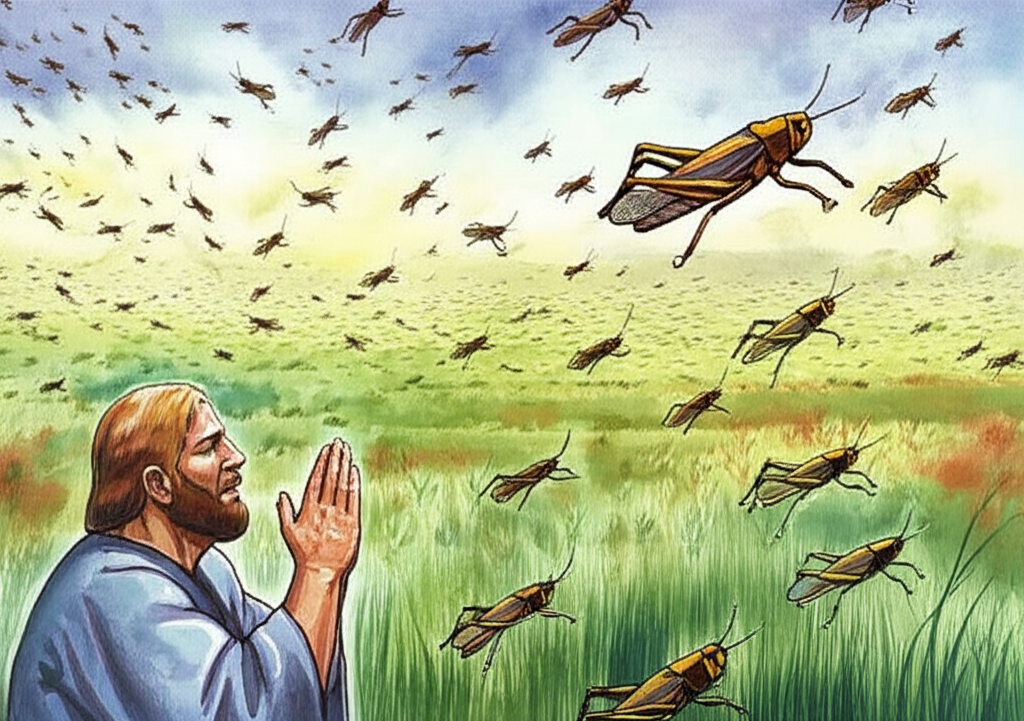
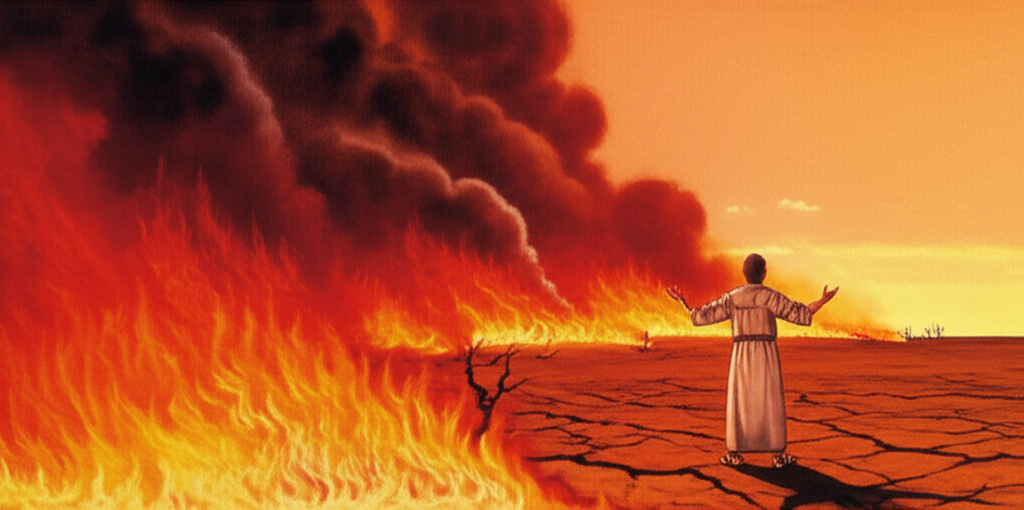

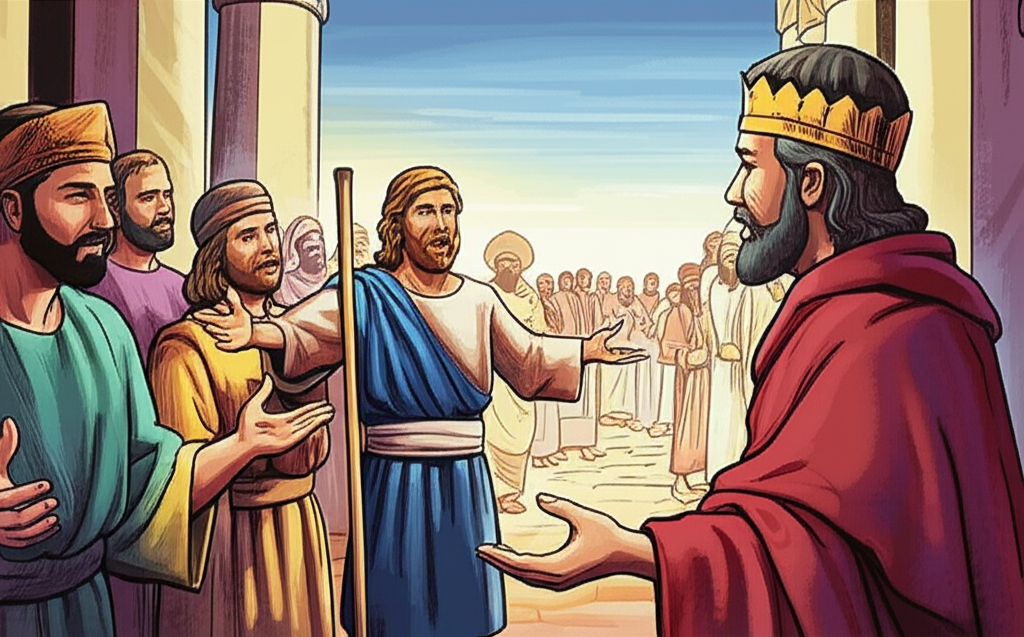

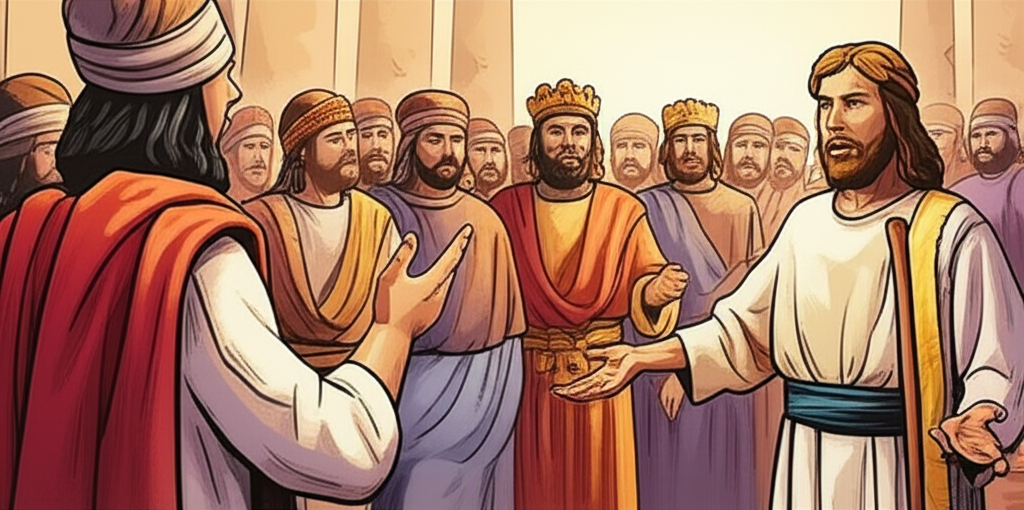

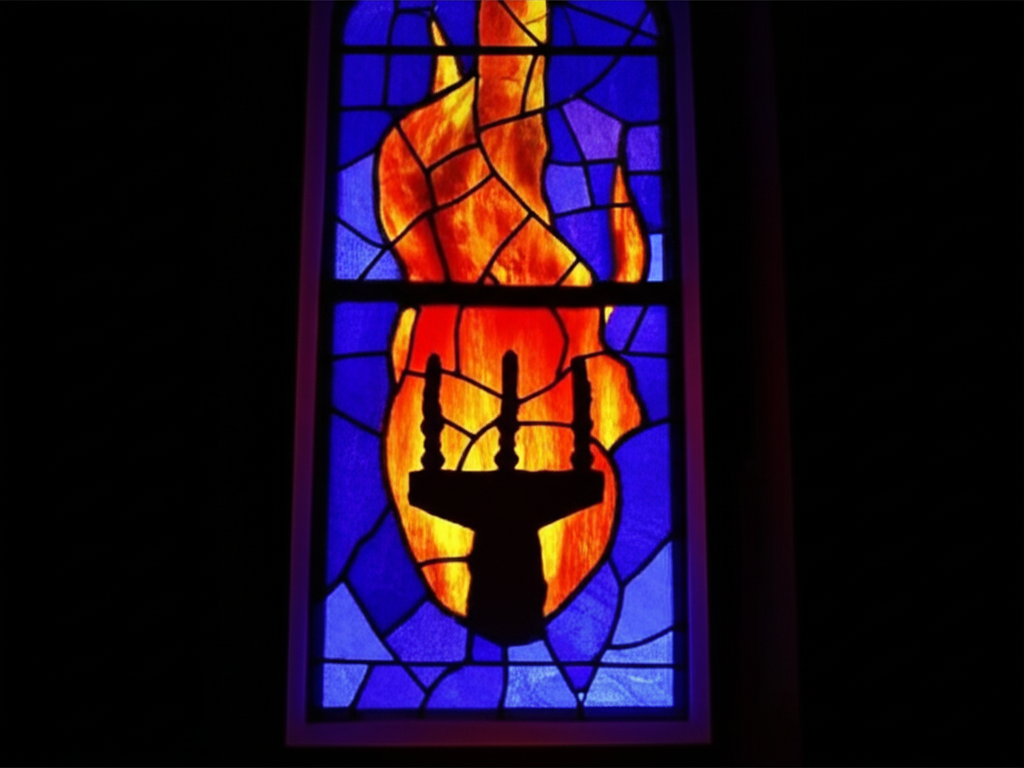
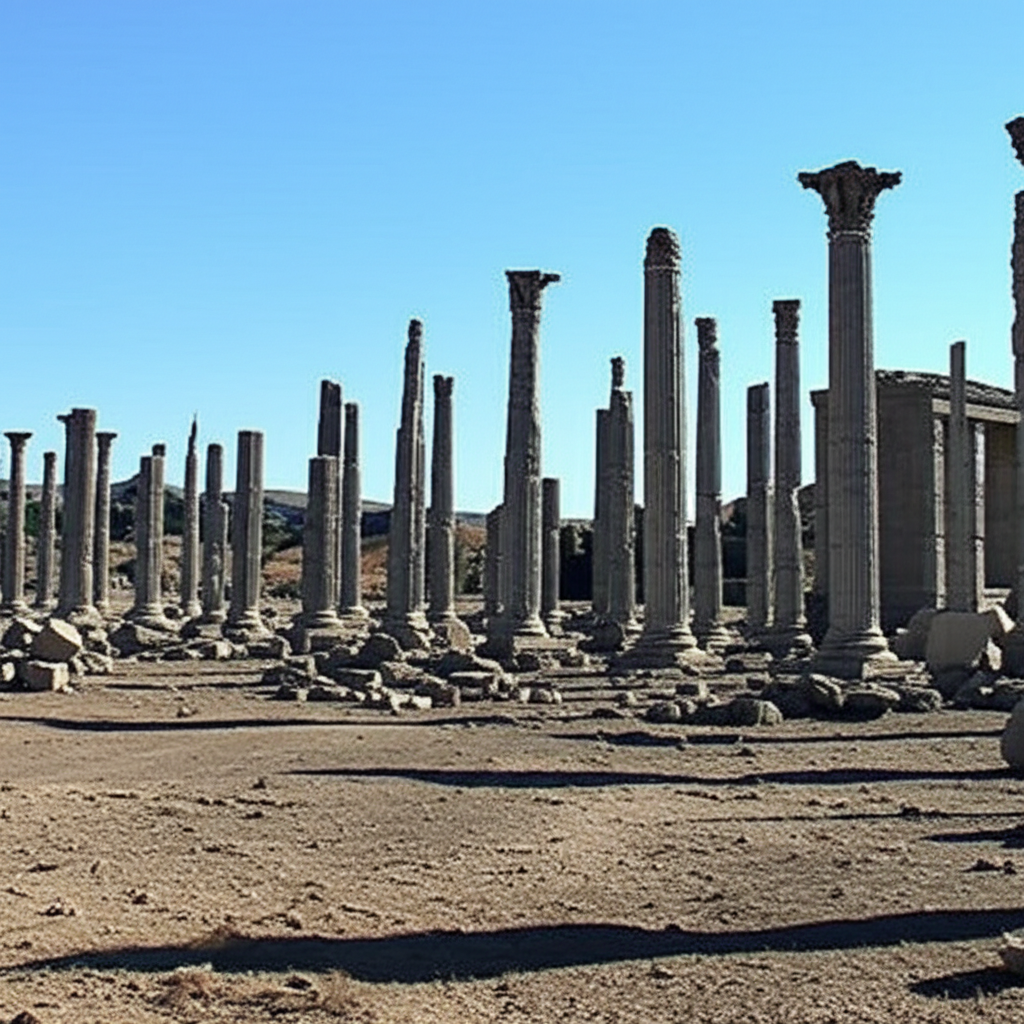
Amos chapter 7 kjv
- 1 Thus hath the Lord GOD shewed unto me; and, behold, he formed grasshoppers in the beginning of the shooting up of the latter growth; and, lo, it was the latter growth after the king's mowings.
- 2 And it came to pass, that when they had made an end of eating the grass of the land, then I said, O Lord GOD, forgive, I beseech thee: by whom shall Jacob arise? for he is small.
- 3 The LORD repented for this: It shall not be, saith the LORD.
- 4 Thus hath the Lord GOD shewed unto me: and, behold, the Lord GOD called to contend by fire, and it devoured the great deep, and did eat up a part.
- 5 Then said I, O Lord GOD, cease, I beseech thee: by whom shall Jacob arise? for he is small.
- 6 The LORD repented for this: This also shall not be, saith the Lord GOD.
- 7 Thus he shewed me: and, behold, the LORD stood upon a wall made by a plumbline, with a plumbline in his hand.
- 8 And the LORD said unto me, Amos, what seest thou? And I said, A plumbline. Then said the LORD, Behold, I will set a plumbline in the midst of my people Israel: I will not again pass by them any more:
- 9 And the high places of Isaac shall be desolate, and the sanctuaries of Israel shall be laid waste; and I will rise against the house of Jeroboam with the sword.
- 10 Then Amaziah the priest of Bethel sent to Jeroboam king of Israel, saying, Amos hath conspired against thee in the midst of the house of Israel: the land is not able to bear all his words.
- 11 For thus Amos saith, Jeroboam shall die by the sword, and Israel shall surely be led away captive out of their own land.
- 12 Also Amaziah said unto Amos, O thou seer, go, flee thee away into the land of Judah, and there eat bread, and prophesy there:
- 13 But prophesy not again any more at Bethel: for it is the king's chapel, and it is the king's court.
- 14 Then answered Amos, and said to Amaziah, I was no prophet, neither was I a prophet's son; but I was an herdman, and a gatherer of sycomore fruit:
- 15 And the LORD took me as I followed the flock, and the LORD said unto me, Go, prophesy unto my people Israel.
- 16 Now therefore hear thou the word of the LORD: Thou sayest, Prophesy not against Israel, and drop not thy word against the house of Isaac.
- 17 Therefore thus saith the LORD; Thy wife shall be an harlot in the city, and thy sons and thy daughters shall fall by the sword, and thy land shall be divided by line; and thou shalt die in a polluted land: and Israel shall surely go into captivity forth of his land.
Amos chapter 7 nkjv
- 1 Thus the Lord GOD showed me: Behold, He formed locust swarms at the beginning of the late crop; indeed it was the late crop after the king's mowings.
- 2 And so it was, when they had finished eating the grass of the land, that I said: "O Lord GOD, forgive, I pray! Oh, that Jacob may stand, For he is small!"
- 3 So the LORD relented concerning this. "It shall not be," said the LORD.
- 4 Thus the Lord GOD showed me: Behold, the Lord GOD called for conflict by fire, and it consumed the great deep and devoured the territory.
- 5 Then I said: "O Lord GOD, cease, I pray! Oh, that Jacob may stand, For he is small!"
- 6 So the LORD relented concerning this. "This also shall not be," said the Lord GOD.
- 7 Thus He showed me: Behold, the Lord stood on a wall made with a plumb line, with a plumb line in His hand.
- 8 And the LORD said to me, "Amos, what do you see?" And I said, "A plumb line." Then the Lord said: "Behold, I am setting a plumb line In the midst of My people Israel; I will not pass by them anymore.
- 9 The high places of Isaac shall be desolate, And the sanctuaries of Israel shall be laid waste. I will rise with the sword against the house of Jeroboam."
- 10 Then Amaziah the priest of Bethel sent to Jeroboam king of Israel, saying, "Amos has conspired against you in the midst of the house of Israel. The land is not able to bear all his words.
- 11 For thus Amos has said: 'Jeroboam shall die by the sword, And Israel shall surely be led away captive From their own land.' "
- 12 Then Amaziah said to Amos: "Go, you seer! Flee to the land of Judah. There eat bread, And there prophesy.
- 13 But never again prophesy at Bethel, For it is the king's sanctuary, And it is the royal residence."
- 14 Then Amos answered, and said to Amaziah: "I was no prophet, Nor was I a son of a prophet, But I was a sheepbreeder And a tender of sycamore fruit.
- 15 Then the LORD took me as I followed the flock, And the LORD said to me, 'Go, prophesy to My people Israel.'
- 16 Now therefore, hear the word of the LORD: You say, 'Do not prophesy against Israel, And do not spout against the house of Isaac.'
- 17 "Therefore thus says the LORD: 'Your wife shall be a harlot in the city; Your sons and daughters shall fall by the sword; Your land shall be divided by survey line; You shall die in a defiled land; And Israel shall surely be led away captive From his own land.' "
Amos chapter 7 niv
- 1 This is what the Sovereign LORD showed me: He was preparing swarms of locusts after the king's share had been harvested and just as the late crops were coming up.
- 2 When they had stripped the land clean, I cried out, "Sovereign LORD, forgive! How can Jacob survive? He is so small!"
- 3 So the LORD relented. "This will not happen," the LORD said.
- 4 This is what the Sovereign LORD showed me: The Sovereign LORD was calling for judgment by fire; it dried up the great deep and devoured the land.
- 5 Then I cried out, "Sovereign LORD, I beg you, stop! How can Jacob survive? He is so small!"
- 6 So the LORD relented. "This will not happen either," the Sovereign LORD said.
- 7 This is what he showed me: The Lord was standing by a wall that had been built true to plumb, with a plumb line in his hand.
- 8 And the LORD asked me, "What do you see, Amos?" "A plumb line," I replied. Then the Lord said, "Look, I am setting a plumb line among my people Israel; I will spare them no longer.
- 9 "The high places of Isaac will be destroyed and the sanctuaries of Israel will be ruined; with my sword I will rise against the house of Jeroboam."
- 10 Then Amaziah the priest of Bethel sent a message to Jeroboam king of Israel: "Amos is raising a conspiracy against you in the very heart of Israel. The land cannot bear all his words.
- 11 For this is what Amos is saying: "?'Jeroboam will die by the sword, and Israel will surely go into exile, away from their native land.'?"
- 12 Then Amaziah said to Amos, "Get out, you seer! Go back to the land of Judah. Earn your bread there and do your prophesying there.
- 13 Don't prophesy anymore at Bethel, because this is the king's sanctuary and the temple of the kingdom."
- 14 Amos answered Amaziah, "I was neither a prophet nor the son of a prophet, but I was a shepherd, and I also took care of sycamore-fig trees.
- 15 But the LORD took me from tending the flock and said to me, 'Go, prophesy to my people Israel.'
- 16 Now then, hear the word of the LORD. You say, "?'Do not prophesy against Israel, and stop preaching against the descendants of Isaac.'
- 17 "Therefore this is what the LORD says: "?'Your wife will become a prostitute in the city, and your sons and daughters will fall by the sword. Your land will be measured and divided up, and you yourself will die in a pagan country. And Israel will surely go into exile, away from their native land.'?"
Amos chapter 7 esv
- 1 This is what the Lord GOD showed me: behold, he was forming locusts when the latter growth was just beginning to sprout, and behold, it was the latter growth after the king's mowings.
- 2 When they had finished eating the grass of the land, I said, "O Lord GOD, please forgive! How can Jacob stand? He is so small!"
- 3 The LORD relented concerning this: "It shall not be," said the LORD.
- 4 This is what the Lord GOD showed me: behold, the Lord GOD was calling for a judgment by fire, and it devoured the great deep and was eating up the land.
- 5 Then I said, "O Lord GOD, please cease! How can Jacob stand? He is so small!"
- 6 The LORD relented concerning this: "This also shall not be," said the Lord GOD.
- 7 This is what he showed me: behold, the Lord was standing beside a wall built with a plumb line, with a plumb line in his hand.
- 8 And the LORD said to me, "Amos, what do you see?" And I said, "A plumb line." Then the Lord said, "Behold, I am setting a plumb line in the midst of my people Israel; I will never again pass by them;
- 9 the high places of Isaac shall be made desolate, and the sanctuaries of Israel shall be laid waste, and I will rise against the house of Jeroboam with the sword."
- 10 Then Amaziah the priest of Bethel sent to Jeroboam king of Israel, saying, "Amos has conspired against you in the midst of the house of Israel. The land is not able to bear all his words.
- 11 For thus Amos has said, "'Jeroboam shall die by the sword, and Israel must go into exile away from his land.'"
- 12 And Amaziah said to Amos, "O seer, go, flee away to the land of Judah, and eat bread there, and prophesy there,
- 13 but never again prophesy at Bethel, for it is the king's sanctuary, and it is a temple of the kingdom."
- 14 Then Amos answered and said to Amaziah, "I was no prophet, nor a prophet's son, but I was a herdsman and a dresser of sycamore figs.
- 15 But the LORD took me from following the flock, and the LORD said to me, 'Go, prophesy to my people Israel.'
- 16 Now therefore hear the word of the LORD. "You say, 'Do not prophesy against Israel, and do not preach against the house of Isaac.'
- 17 Therefore thus says the LORD: "'Your wife shall be a prostitute in the city, and your sons and your daughters shall fall by the sword, and your land shall be divided up with a measuring line; you yourself shall die in an unclean land, and Israel shall surely go into exile away from its land.'"
Amos chapter 7 nlt
- 1 The Sovereign LORD showed me a vision. I saw him preparing to send a vast swarm of locusts over the land. This was after the king's share had been harvested from the fields and as the main crop was coming up.
- 2 In my vision the locusts ate every green plant in sight. Then I said, "O Sovereign LORD, please forgive us or we will not survive, for Israel is so small."
- 3 So the LORD relented from this plan. "I will not do it," he said.
- 4 Then the Sovereign LORD showed me another vision. I saw him preparing to punish his people with a great fire. The fire had burned up the depths of the sea and was devouring the entire land.
- 5 Then I said, "O Sovereign LORD, please stop or we will not survive, for Israel is so small."
- 6 Then the LORD relented from this plan, too. "I will not do that either," said the Sovereign LORD.
- 7 Then he showed me another vision. I saw the Lord standing beside a wall that had been built using a plumb line. He was using a plumb line to see if it was still straight.
- 8 And the LORD said to me, "Amos, what do you see?" I answered, "A plumb line." And the Lord replied, "I will test my people with this plumb line. I will no longer ignore all their sins.
- 9 The pagan shrines of your ancestors will be ruined, and the temples of Israel will be destroyed; I will bring the dynasty of King Jeroboam to a sudden end."
- 10 Then Amaziah, the priest of Bethel, sent a message to Jeroboam, king of Israel: "Amos is hatching a plot against you right here on your very doorstep! What he is saying is intolerable.
- 11 He is saying, 'Jeroboam will soon be killed, and the people of Israel will be sent away into exile.'"
- 12 Then Amaziah sent orders to Amos: "Get out of here, you prophet! Go on back to the land of Judah, and earn your living by prophesying there!
- 13 Don't bother us with your prophecies here in Bethel. This is the king's sanctuary and the national place of worship!"
- 14 But Amos replied, "I'm not a professional prophet, and I was never trained to be one. I'm just a shepherd, and I take care of sycamore-fig trees.
- 15 But the LORD called me away from my flock and told me, 'Go and prophesy to my people in Israel.'
- 16 Now then, listen to this message from the LORD: "You say,
'Don't prophesy against Israel.
Stop preaching against my people. ' - 17 But this is what the LORD says:
'Your wife will become a prostitute in this city,
and your sons and daughters will be killed.
Your land will be divided up,
and you yourself will die in a foreign land.
And the people of Israel will certainly become captives in exile,
far from their homeland.'"
- Bible Book of Amos
- 1 Judgment on Israel's Neighbors
- 2 Judgment on Judah
- 3 Israel's Guilt and Punishment
- 4 Israel Has Not Returned to the Lord
- 5 Seek the Lord and Live
- 6 Woe to Those at Ease in Zion
- 7 Warning Visions
- 8 The Coming Day of Bitter Mourning
- 9 The Destruction of Israel